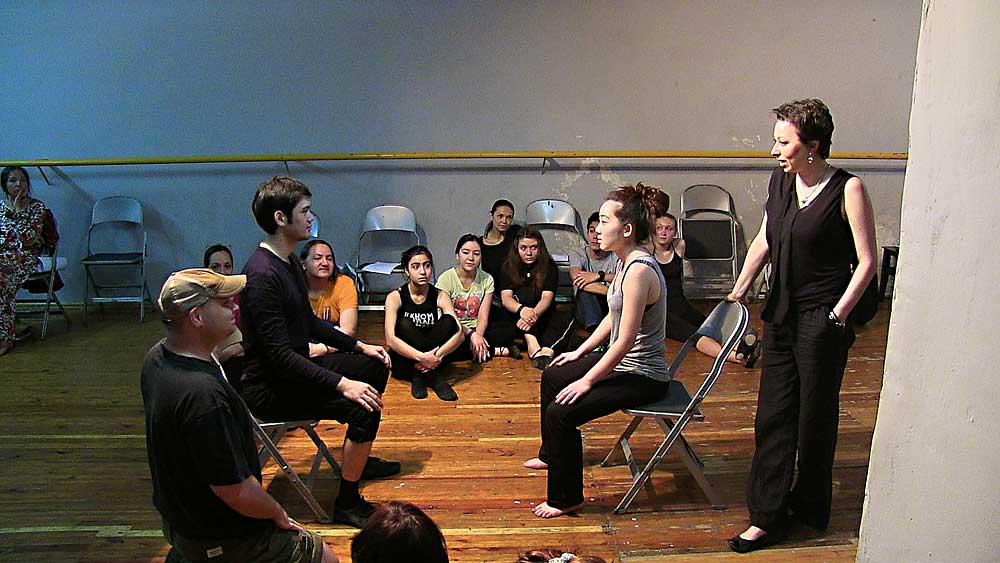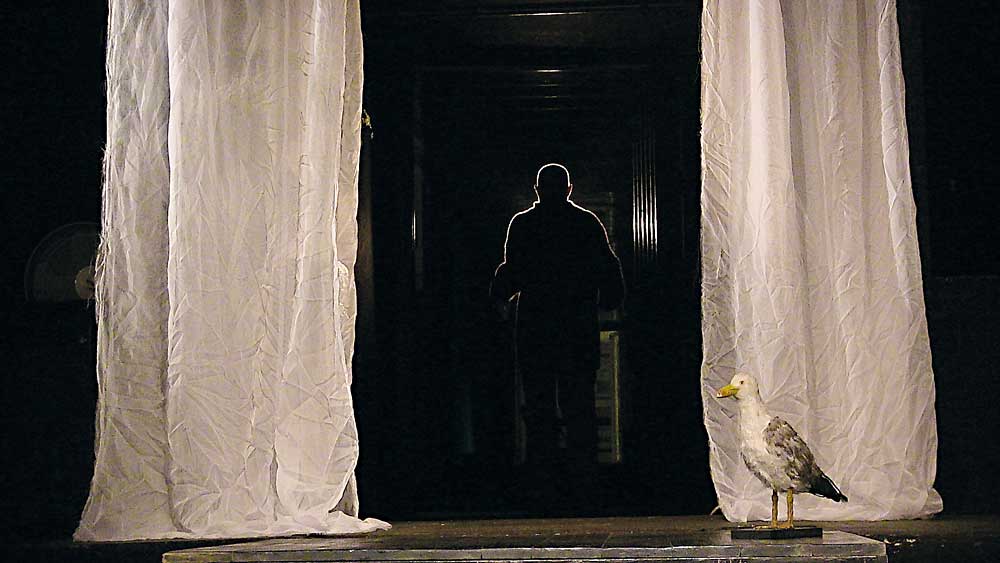We stepped into the sun. All of us were instantly blinded and our bodies rudely assaulted by intense heat. It wasn’t just that we were Seattle-ites unused to sunlight; it was that the overwhelming, semi-arid climate of central Uzbekistan was almost too much to bear on top of the emotional devastation we’d experienced that morning. Blinking in that painful Uzbek light, I wished I was still in the cool, celebratory darkness of the previous night, when we’d opened a new play by Dave White I’d co-directed at the Ilkhom Theatre in Tashkent. But the night of vodka and laughter was gone, and this morning I’d learned that my mentor and friend, Jerry Manning, artistic director of the Seattle Repertory Theatre, was dead.
After getting this heartbreaking news at breakfast, we, the 19 members of the Seagull Project, had traveled all morning by train, heads bowed in varying degrees of grief and jetlag, to arrive in the classical heart of the country: Samarkand. Now just over a week into our trip, we had left behind our host city of Tashkent, some 200 miles to the east, a Soviet-era jungle of cement bridges and bold 1960s architecture, arriving in an otherworldly, cobalt blue-painted Silk Road paradise.
Samarkand stands as one of the oldest cities in the world, a constant witness to destruction and rebirth, as nations war and borders shift all around it. Walking the dirt streets amid the city’s towering Islamic architecture, how small I felt! Weeks later, I learned that, in Samarkand’s ancient days, blue was the color of mourning. I was surrounded by blue that day.
We stopped in front of a Russian Orthodox church; it seemed appropriate, as we were performing Chekhov, to be confronted with an emblem of 19th-century Russia. I personally bristled at the idea of going inside, wanting to turn off my brain rather than allow in any spiritual influence. But I lost the argument, and the entire theatre troupe walked into the beautiful church and stood in awe. I breathed in the incense deeply and lit a candle. In its flickering light, I had a quiet moment with Jerry. The saints stared peacefully from their perches. I was on the opposite side of the Earth from where Jerry had died, in a city that could not have felt more foreign to me, and yet in that moment the country embraced me, and I fell into its open arms.
A weird and wonderful perfect storm of politics, new international-relations priorities and Dionysian luck had converged to bring our theatre company 6,000 miles from our Seattle home to perform Chekhov for the Uzbeks. The Seagull Project, which rehearses and performs at ACT–A Contemporary Theatre, had received a U.S. government grant to visit the renowned Ilkhom Theatre for a few weeks, taking part in and producing the Festival of American Culture Ilkhom East/West, in April and May of this year.
The U.S. Embassy in Uzbekistan had never given an arts organization such a large grant, and this reticence was not accidental. We happened to find a magical window of opportunity during a period of transition in U.S./Uzbek relations, in which President Islam Karimov’s previously aggressive stance toward the West was softening, and the U.S. Embassy was eager to extend a cultural olive branch to the region. It’s not simply that our trip was an anomaly—it was entirely unprecedented. We were in fact the first American company to perform at the Ilkhom.

Four enthusiastic Seattle actors founded the Seagull Project three years ago, under the flag of doing justice to Chekhov’s first play. Our aim was to focus on process, not product. We started without a director. We married an extensive rehearsal scheme with a broad-scoped dramaturgical approach that encouraged local artists and students to collaborate and investigate.
Our fledgling company delved into The Seagull through different rehearsal methods, and collected fresh ideas and interpretations of the play through community outreach. We dreamed of using this community method to deepen our work abroad, and to find new perspectives in other countries. This past year, John Langs, associate artistic director at ACT, joined us as the project’s director, and he will guide us in our larger pursuit: exploring and staging Chekhov’s entire canon.
After a year of workshops and rehearsals, and the successful premiere of The Seagull at ACT Theatre in 2013, our company looked to Tashkent, one of Seattle’s 21 designated “sister cities.” The Ilkhom had already done its part, visiting Seattle in 2008 and performing two plays at ACT Theatre; it had since maintained a healthy exchange with the University of Washington, often accepting American students into its three-year program. That’s how Seagull Project member Tyler Polumsky became the first American member of the Ilkhom, and his attachment to both companies (as well as the government support through the sister-city program) provided a strong case for us to take our first international step as a company into the deserts of Central Asia.
The Ilkhom is a beacon of truth and creativity in Uzbekistan, a country where traditional Muslim values predominate and freedom of expression is often limited. Founded in 1979, it became the first independent theatre in the Soviet Union. From its birth, the Ilkhom was a home for dissidence and the political undercurrents of Uzbekistan.
Mark Weil, Ilkhom’s founding artistic director, was an artistic force who risked (and eventually gave) his life directing there. In its formative years the theatre was entirely secret, stealthily producing plays forbidden by Soviet censors in the basement of a men’s social club. When the Ilkhom made the bold choice to step into the spotlight in the early ’80s, the company toured to Moscow and was greeted with outrage and threats. Surprisingly, though, the Ilkhom was eventually granted full artistic immunity by one of the more powerful members of the Uzbek cabinet.
But even with relative freedom from Soviet interference, the theatre did not—and currently does not—live beyond the gaze of a powerfully conservative Uzbek government. As part of the festival, we were staging a new American play, Dance on Bones, by Dave White, based on a collection of poems set in a dystopian world that echoes the post-Soviet landscape of Russia. Jazz rises with the apocalyptic floods, becoming the savior for a new world, with culture as humanity’s flotation device. We were in rehearsal when a police officer (a “pickle,” as they are called, after their awful green uniforms) and his dog appeared at the door of the theatre. We kept rehearsing, surreal though it seemed, as police searched the whole theatre. As the dog bomb-sniffed, we performed laments about “the Man of Steel,” underscored by our Uzbek jazz quartet. The Ilkhom actors never acknowledged the “visitors”—for them this just another day living in the shadow of the not-quite-free post-Soviet era.
This calm, businesslike attitude should not be mistaken for indifference. It is how the Ilkhom has survived. It was one morning seven years ago that Weil, the troupe’s founding artistic director, was stabbed to death on his front steps. He was in tech for his Oresteia, which was to open the next day. There is speculation that the theatre’s unshackled creativity and cultural influence was becoming too much of a threat; others believe that he was killed because of the depiction of Islam in a recent Ilkhom production. Whatever the cause, his wallet and valuables were left on his person; it was clearly a murder of intent.
The head may have been removed, but the heart of the Ilkhom beat on, and Weil’s company opened Oresteia the next night. There was never a moment at the Ilkhom when we were not acutely aware of the price Weil paid for his revolutionary theatre.


